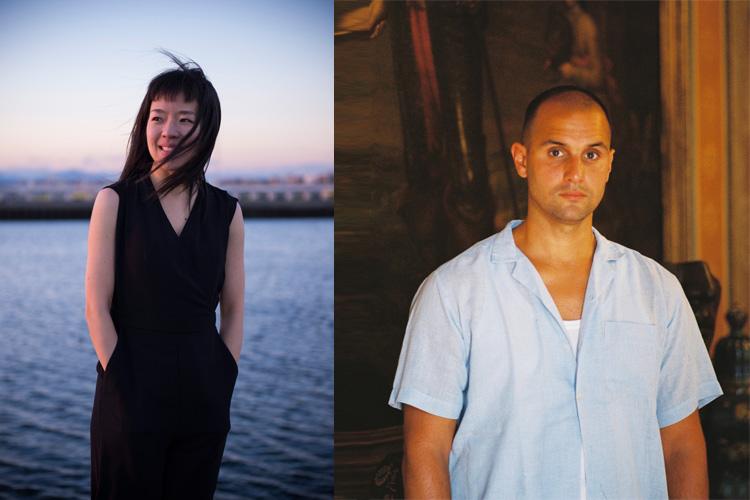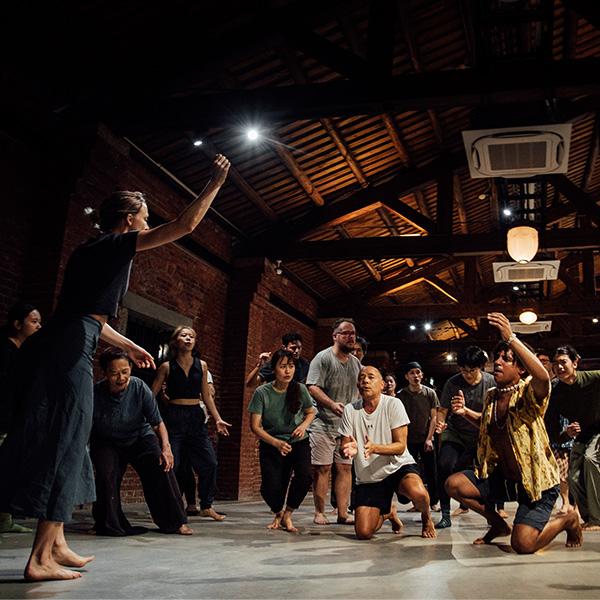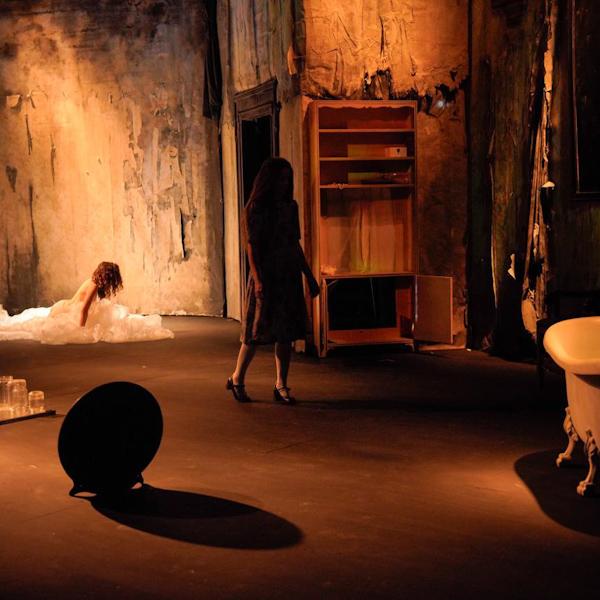
Biennale College Teatro 2022: the winners of the call for a site-specific performance
The projects by Aine E. Nakamura and Antoine Neufmars will be on stage at the 50th International Theatre Festival.
Biennale College Teatro
Performance site-specific
The Japanese-American performer, singer and composer Aine E. Nakamura and the French performer, dramaturge and photographer Antoine Neufmars are the winners of the second edition of the Biennale College Teatro grants for site-specific performances, conceived for the outdoor spaces of Venice. The two performers, who were selected through the presentation of excerpts of their works from a total of 77 preliminary submissions, will develop their project with a grant of 25,000 euro to present them in their finished form at the 50th International Theatre Festival (24 June > 3 July), respectively Under an Unnamed Flower and Odorama.
Under an unnamed flower
Aine E. Nakamura
The Japanese-American performer, composer and singer Aine E. Nakamura, with the piece she presented from her future transborder project, Under an Unnamed Flower, by virtue of a melodic use of the voice, of an original process of deconstructing and reconstructing language, of freeform figurations and three-dimensional words that without prejudice reach across the boundaries of Theatre, Dance and Music, bouncing us within a poetic vortex of light, that spills forth visions, dreams, memories, colours and feelings, catapults us – while maintaining an uninterrupted relationship with her personal past, her family and one of her countries Japan – into a Present that is highly ambivalent and complex, in which the dramatic events of History, such as wars, the violence of invasions, the uprooting and loss of one’s personal land, intertwine with the breath of her rarefied and enigmatic narrations, implacably becoming entangled in her private life as an exile, as a wanderer who pleas for non-violence and quiet resistance.
Intimately connected to her château intérieur and the surrounding spiritual world, her ashen face appearing historiated by the snow, Aine E. Nakamura, as an unnamed flower that lives at the site in the wind, her legs and arms constantly moving for the accuracy of the Ritual, her nimble eyes scrutinising contemporary society, her ears collecting the stories that spin through the airwaves as an antidote to oblivion, in a symbiotic relationship with Nature (plants, animals, earth) and Humanity in its entirety, absorbing their every mood, listens to their voices which she then relaunches in a peacefully “revolutionary” way, reclaiming the emotional universes that each of us carries within.
As she thus moves away from the routine courses of performance and the conventional modulations of sound in the western tradition, with an enthralling plurilingualism unfettered from the obligations of reality, Aine E. Nakamura morphs into a sort of hypnotic pied piper who, behind her apparent childlike awe, leaves us spellbound – like one of those creatures in a fairy-tale kimono of graceful beauty in the novels by Kawabata or Akutagawa – talking in soft tones of things that she actually steadfastly disapproves of, and refusing, even when the darkness forces its way like a spectral beast into the labyrinth of existence, the unavoidability of compromise and objecting to the oppressive social coercion of the political pigsty.
Odorama
Antoine Neufmars
I smell. Therefore I am.
Memory, smell, the loss of them: an equation that outlines the departure from our selves and triggers an existential reflection. A fragrance does not just generate a memory; it bears witness to it, to that which we are and the mysterious journey we have undertaken.
With a background of experiences that range from the visual arts to his work as a dramaturge, Antoine Neufmars, the Belgian artist based in Paris, presented a fragment of his study for the project ODORAMA.
Starting from a personal ailment, anosmia, the loss of the sense of smell consequent to Covid-19, the artist outlines an investigation into the identifying value of memory through the perception of a specific odour.
Like a prisoner serving a life sentence in isolation who needs to retain some tie to his past, Neufmars establishes a One-to-One relationship with a passenger/client/cellmate to cope with the seclusion, the impairment, and to process his imprint as a living being, by sharing memories with an Other.
Dodging the stranger between bottles of diversified essences that generate fiercely evocative scenarios, the performer allows himself to be guided by his states of vertigo to reconsider the codes of desires, of his sexuality, of never-expressed needs.
Through the use of the body, of liquids, photographs and the spoken/written/inhabited text, Neufmars, like a new Virgil, cautious but inflexible, presses the spectator to meet and embrace the scientist standing before him as the only possibility for sensory redemption.
Through a new, apparently damaged reconnaissance apparatus, the artist rediscovers the communication codes at his own risk, casting out among the laboratory flasks the most intimate lacerated part of his self to reactivate a shared suture of it.
A confession in the abysses, into which the spectator has been dragged to observe as though sitting at the bottom of a pool; low on oxygen in an amniotic fusion with the performer that leaves its mark.
What would our identity be without memories?
Antoine Neufmar’s essential question seeks answers in this journey through Odorama: the scent of a son, that of a partner, a lover’s skin; if a sponge were to wipe away all these imprints, how could we rise back to the surface?
Social distancing, double masking, border closings and inconceivable wars drive us away from ourselves as individuals and as a community; odours, and odours alone, give us the rules for the social animal that we are; they are gateways to come into connection with a mysterious room that we have bricked up.
Antoine Neufmars not only mathematically lays bare his personal autobiographical hell, he leads us, in this unexpected expressive experiment, to unmask that which we have deprived ourselves of by indulging the outside world and cauterising the senses and personal memories that remind us of the zenith of awareness we should strive for.
Stefano Ricci Gianni Forte


